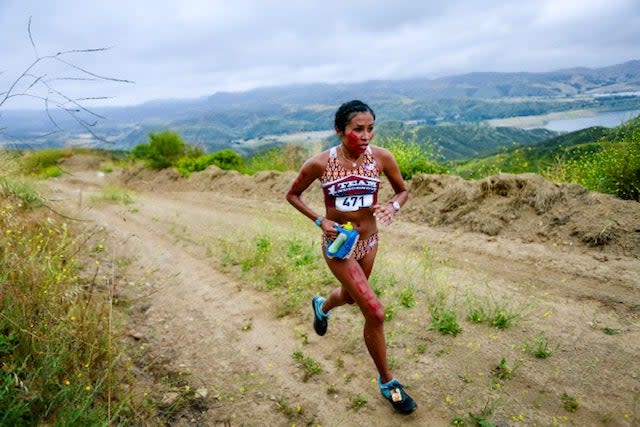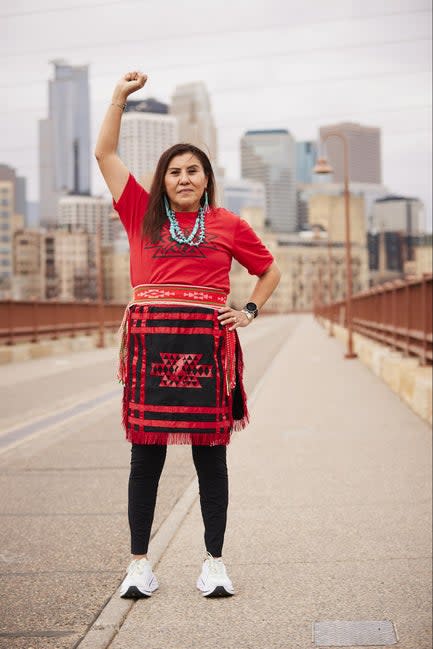Indigenous Athletes are Running For Justice
This article originally appeared on Trail Runner
A 2016 Report by the Urban Indian Health Institute found that of 5,712 Indigenous girls and women who were reported missing, only 116 were logged in the Department of Justice database for missing people.
Getting Started
That number – 116 – stuck in runner Jordan Marie Daniel's head. So much so that she inked it in red paint on her body when she toed the line at the 2019 Boston Marathon. Daniel raced to honor a missing Indigenous woman with each mile she ran, to amplify the cause of Missing and Murdered Indigenous Women (and the more inclusive MMIR, where the R stands for Relatives). Images of Daniel racing Boston with bright red paint on her arms and legs and a vivid handprint over her mouth to symbolize the systemic silencing and erasure of Indigenous voices swept the internet.
"At that point, when it felt like all the organizing I was doing, how I was supporting, and amplification from many other organizations and families fighting for justice wasn’t being taken seriously, I chose to run for justice, for them," says Daniel.
RELATED: Jordan Marie Daniel Is Running For Justice
The issue is personal for Indigenous runners like Verna Volker, founder of Native Women Running. "I often think of my own daughter who loves life, drawing, singing, and laughing with her brothers. There's realness and tenderness in that. Many stories drive me to bring awareness to MMIW," says Volker.
"I hope that when other runners learn this, it motivates them to be co-conspirators with us as we advocate, inform, mobilize, and support the families who have lost loved ones," says Daniel.

Getting Connected
Volker and Native Women Running are hosting a virtual race May 5th-8th that runners can participate in at their own distance and pace. Funds raised through the event will go to MMIW USA, which works directly with families affected by violence to offer educational resources and support. Additional funds will be donated to the Native Women’s Association of Canada.
"I don't want my activism to be performative. I want my activism to be in the quietness but to gather everyone to draw and honor our Native sisters and all Native people who go missing or [are] murdered," says Volker.
On Thursday, May 5th, Daniel and her organization Rising Hearts will host a MMIR Awareness and Safety Workshop. The workshop aims to equip athletes with practical self-defense tools and knowledge to empower them to run and navigate the world with the safety and security that many take for granted. Rising Hearts is also hosting a virtual and in-person run May 4th-8th.
RELATED: What We Can All Learn From Indigenous Runners
Indigenous women are seven times more likely to go missing or be the victims of violence than any other group, and runners like Daniel, Volker, and the communities they steward are using every tool, be it athletic or political, to call attention to that crisis.
"We organize as much as we can, we fundraise as much as we can, we push for legislation as much as we can, we create task forces as often as we can, but those efforts don’t come easy. It’s heartbreaking that we have to prove why our lives matter and why we need to be protected by the government, media and non-Indigenous peoples," says Daniel.
"It's important for all runners to engage in the MMIW (Missing and Murdered Indigenous Women) issue because everyone can be a part of this movement. Several months ago, when Gabby Petito went missing, her story went worldwide," says Volker. She, as well as many other Indigenous activists, pointed out that when Indigenous women go missing, there's not nearly the same level of urgency and coverage. "As Native women, our voices are often silenced in life, so I think non-Natives have the most powerful voice for us. That's why our own people are taking the lead in this movement, but we need everyone to care like they did for Gabby Petito, ‘America's daughter.’ Sadly, many of our native women who are taken or murdered will often be blamed for their own disappearance or death. Some don't even get any coverage at all."
Volker and Daniel are both participating in our panel on MMIR Awareness and Advocacy for Runners on May 3rd.
"Most importantly, stand with and support native people all year round, not only on this day.” – Verna Volker
Take Action
"This history of violence just didn’t happen," says Daniel. "Systems that exist today are designed to not benefit us, communities of color and marginalized communities. There is a long history of violence. This has carried on over hundreds of years and has transformed through different tactics and policies that Indigneous peoples experience."
While there are plenty of stories about women's safety in the running space, few articles and resources address the intersectional nature of violence head-on or propose systemic solutions. This racialized and gendered violence is part of a larger history, and is connected to intersecting issues today, like climate change.
"I hope that when other runners learn this, it motivates them to be co-conspirators with us as we advocate, inform, mobilize, and support the families who have lost loved ones.” – Jordan Marie Daniel
"Violence against the Earth is Violence against Women and our bodies. And that is the imbalance I speak to. This is why we need to include this epidemic and issue when we advocate for climate justice," says Daniel. "This is happening beyond colonial borders and is impacting many Indigenous communities and marginalized communities where fossil fuels are being extracted and dirty infrastructure projects are being built. We need to be better relatives to each other. We need to live in kinship with the lands as we do with each other. When that can happen, I think we see a better, safer, and thriving future for us all."
RELATED: Verna Volker Finds Healing In A Community She Built

Volker says that anyone can, and should, be part of the solution.
"It's important that everyone, whether Native or non-Native, knows that they can be a part of taking action." Volker urges runners to educate themselves (see below for her full list of recommended resources), participate in Native-led events that help raise awareness, and get politically active by signing petitions and pushing their representatives for legislation that directly addresses this crisis.
"Most importantly, stand with and support native people all year round, not only on this day," says Volker.
Daniel also urges athletes and activists to reach out to their representatives and ask them if they're informed about the MMIR crisis, up-to-date on what organizations are active in their area, and to push for Secretary of the Interior Deb Haaland's proposed Missing and Murdered Indigenous Person's Unit.
"The ignorance, racism, fetishization, and hypersexualization of Indigenous women contribute to this violence, mistreatment, and feeling 'disposable,'" says Daniel. "It has to stop, and that’s why we need non-Indigenous people, allies, to help us stop this, find solutions, and help create a better, safer world, for everyone to be supported, respected, and appreciated.”
For exclusive access to all of our fitness, gear, adventure, and travel stories, plus discounts on trips, events, and gear, sign up for Outside+ today.

